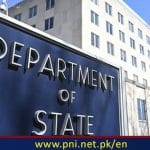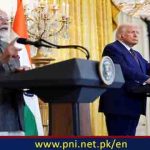WASHINGTON, Jul 29 (APP): The United States says it is working on a diplomatic solution in the wake of the outbreak of hostilities along the border between Israel and Lebanon after a rocket attack that killed civilians in the Israeli occupied Golan Heights, for which it blamed Hezbollah.
“This attack was conducted by Lebanese Hezbollah. It was their rocket, and launched from an area they control,” White House National Security Council spokesperson Adrienne Watson said in a statement on Sunday, despite the Lebanese group having firmly denied responsibility.
Watson added that the White House has been in continuous talks with Israeli and Lebanese officials since a rocket struck the Druze town of Majdal Shams, as fears of a wider war lurk.
In New York, UN Secretary-General Antonio Guterres called on all parties to exercise maximum restraint and reiterated once again his consistent call on all concerned to avoid any further escalation.
“The exchanges of fire across the Blue Line must cease immediately. All parties must comply with their obligations under international law,” said the note, adding that parties must urgently recommit to the full implementation of UN Security Council resolution 1701 and immediately return to a cessation of hostilities.
[Adopted by the Security Council in 2006, resolution 1701 aimed at ending the war that year between Israel and Hezbollah. It calls for an end to hostilities, the withdrawal of Israeli forces from Lebanon, and the establishment of demilitarized zone.]
At the same time, Iran warned Israel any new military “adventures” in Lebanon could lead to “unforeseen consequences,” according to media reports.
Western powers, including France, Germany and Britain, condemned the attack and appealed for calm, the reports said.
But the European Union called for an independent probe into what happened.
Overnight, the Israeli military said it struck a number of targets inside Lebanon, though the intensity of the strikes was similar to months of cross-border fighting between Israel and Hezbollah.
Saturday’s attack comes at a sensitive time, as Israel and Hamas are negotiating a cease-fire proposal to end the nearly 10-month Israeli war in Gaza and free the roughly 110 hostages.
The rocket slammed into a football pitch where dozens of youths were playing in the Druze town of Majdal Shams, located about 12 kilometers (7 miles) south of Lebanon.
On Sunday morning, many of the bodies were brought to a community center in Majdal Shams, where family members had gathered.
Israel captured the Golan, a strategic plateau overlooking northern Israel, from Syria in the 1967 Mideast war and annexed it in 1981. The international community considers the area to be occupied territory. Since then, there have been frequent clashes between Israel and Hezbollah.
Since early October, Israeli airstrikes in Lebanon have killed more than 500 people, including many civilians. On the Israeli side, 22 soldiers and 24 civilians have been killed.
Israeli Prime Minister Benjamin Netanyahu, who was in America at the time of the strike, warned that Hezbollah “will pay a heavy price for this attack, one that it has not paid so far.”
The Israeli military’s Chief of Staff Lt. Gen. Herzi Halevi met with leaders of Majdal Shams on Saturday night, and said Israel was preparing for “the next stage of fighting” in the north. “We know how to strike even very far from the state of Israel,” he said.
Hezbollah denied it was responsible for the attack, but Halevi claimed the rocket was a Falaq rocket with a 53-kilogram warhead that belonged to Hezbollah.
Lebanon’s government, in a statement that didn’t mention Majdal Shams, urged an “immediate cessation of hostilities on all fronts” and condemned all attacks on civilians.
Iran on Sunday warned Israel that a strong reaction to the Golan Heights strike will lead to “unprecedented consequences.”
“Any unwise action by the Zionist regime is a ground-paving for expansion of instability, insecurity and war in the region,” said Nasser Kanaani, the spokesperson for the Iranian Foreign Ministry.
An Egyptian official said the attack in the Israeli-occupied Golan Heights could give urgency to the negotiations to reach a cease-fire deal in Gaza, which would be reflected on the Israeli-Hezbollah front, according to reports.
He said mediators will use such an attack to press for a cease-fire in Gaza to avoid an all-out war in the region.
“Both fronts are connected,” he said. “A cease-fire in Gaza will lead to a cease-fire with Hezbollah.”
Officials from the United States, Egypt and Qatar are meeting Sunday with Israeli officials in Rome in the latest push for a cease-fire deal in Gaza.
Follow the PNI Facebook page for the latest news and updates.








